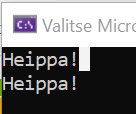Data type examples
double airPressure = 1.2; // Use for most decimal numbers
decimal accountBalance = 1.2m; // Use for accuracy (e.g. financial applications)
float bulletSpeed = 1.2f; // Use only when you know its precision will be enough
bool loggedIn = false;
char previousInput = 'b';
charis only used for single characters, multi-character strings will be introduced in a bit.
Extra: Casting data types
Data types can be cast to another either...
...implicitly:
double valueAddedTax = 25.5;
decimal valueAddedTaxDecimal = valueAddedTax;
...explicitly:
double valueAddedTax = 25.5;
decimal valueAddedTaxDecimal = (decimal)valueAddedTax;
- Casting is useful when, for example, when we want to sum a
doubleand adecimaltogether:double a = 1.0; decimal b = 2.1m; Console.WriteLine(a + (double)b); Console.WriteLine((decimal)a + b); - C# Guide: Casting and type conversions
Assignments (variables)
Assignments (data types)
Arithmetic operations?
- Arithmetic operations are common mathematical operations:
- Addition
- Subtraction
- Multiplication
- Division
- Modulus (remainder, in Finnish jakojäännös)
- The operations are represented by arithmetic operators
Arithmetic Operators
| Operator | Name | Example | Description |
|---|---|---|---|
+ |
Addition | a + b |
Adds together two values |
- |
Subtraction | a - b |
Subtracts one value from another |
* |
Multiplication | a * b |
Multiplies two values |
/ |
Division | a / b |
Divides one value by another |
% |
Modulus | a % b |
Returns the division remainder |
++ |
Increment | a++ |
Increases the value by 1 |
-- |
Decrement | a–- |
Decreases the value by 1 |
Exercise 1: Trying Out Variables
- Create a new console application and declare two variables of type
double. - Assign different values for those variables.
- Print the sum, difference, fraction and product of those values to the console.
The assignment operator
We have used the assignment operator = for assigning values for variables:
int x;
x = 25;
- Note the difference between
=and==introduced in Lecture 3!=is used for assigning values for variables,==is used for comparing values
Assignment operators
| Operator | Example | Same As |
|---|---|---|
= |
x = 5 |
x = 5 |
+= |
x += 5 |
x = x + 5 |
-= |
x -= 5 |
x = x - 5 |
*= |
x *= 5 |
x = x * 5 |
/= |
x /= 5 |
x = x / 5 |
%= |
x %= 5 |
x = x % 5 |
- As shown here, there are some assignment operators that work as shorthands for longer assignments
- Particularly useful when the variable name is longer, so you don't have to write it twice when its value is changed
Assignment operators: An example
int uppercaseLetters = 2;
uppercaseLetters += 4; // is now 6
int specialCharacters = 2;
specialCharacters *= 2; // is now 4
Console.WriteLine(uppercaseLetters);
Console.WriteLine(specialCharacters);
Increment and decrement operations
- You can increment or decrement a variable value by 1 with dedicated short-hands
- Most programming languages implement these!
- Addition example:
int a = 3; a = a + 1; // a is now 4 a += 1; // a is now 5 a++; // a is now 6
- Subtraction example:
int a = 3; a = a - 1; // a is now 2 a -= 1; // a is now 1 a--; // a is now 0
++and--are called the increment and decrement operators
Extra: Increment/decrement operation precedence
- Note that incrementing can be written as prefix (
++i) or a postfix (i++) - In this example,
a++and++ado exactly the same:int a = 3; a++; // a is now 4 ++a; // a is now 5 - Their exact difference is complicated, and in some cases, using either prefix or postfix form can produce different results:
int a = 3;
int b = ++a;
Console.WriteLine(b); // 4
Assignment of b happens after ++,
so its value is 4
int a = 3;
int b = a++;
Console.WriteLine(b); // 3
Assignment of b happens before ++,
so its value is 3
Strings
stringis a special type that contains an array of characters.string name = "Sini Aalto";- You can concatenate (i.e., combine) multiple strings with the
+operator:string firstName = "Sini"; string lastName = "Aalto"; string fullName = firstName + " " + lastName; Console.WriteLine(fullName); // Outputs "Sini Aalto"
Character Constants
- Character constants are preceded by a backslash
\and can be used for formatting strings \nrepresents a newlinestring firstName = "Johannes"; string lastName = "Kantola"; string fullName = firstName + "\n" + lastName; Console.WriteLine(fullName); /* This outputs Johannes Kantola */- All character constants are listed here
String Interpolation
- Concatenating multiple variables into one string with the
+operator quickly becomes tedious - It's much easier to use string interpolation by prefixing your target string with
$and inserting the variables inside curly brackets{ }:string animal = "Dog"; string sound = "Woof"; Console.WriteLine($"{animal} says {sound}!"); // Outputs "Dog says Woof!"
String Formatting
- You can add format strings to change the way variables are interpolated into a string
- Add the format string after your variable, separated by a colon (:)
- You can find an overview of format strings and a handy list of both standard and custom strings here
double pi = 3.141592653; Console.WriteLine($"Pi to three digits: {pi:G3}"); // Outputs "Pi to three digits: 3.14"
User input with Console.ReadLine()
- For the next exercise, you'll need the
Console.ReadLine()method - The method pauses the program, waits for an input stream from the console that pops up, and returns the value of the input:
string userInput = Console.ReadLine(); Console.WriteLine(userInput);

Exercise 2: Weekday survey
- Create a console application that asks the user which weekday it is and assigns the answer to a string variable.
- Print
Have a nice <weekday>to the console where<weekday>is replaced with the string the user wrote.